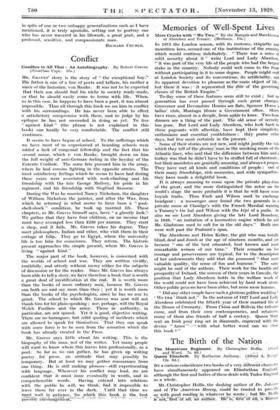Conflict
Goodbye to All That : An Autobiography. By Robert Graves. (Jonathan Cape. 10s.)
MR. GRAVES' story is the story of " the exceptional boy." His father is one of a line of poets and talkers, his mother a niece of the historian,. von Ranke. It was not to be expected that their son should find his niche in society ready-made,' or that he should easily come to terms • with life. When, as in this case, he happens to have been a poet, it was almost impossible. Thus all through this book we see him in conflict with his surroundings. He has never been able to effect a satisfactory compromise with them, and to judge by his epilogue he has not succeeded in doing so yet. To live " against kind " (the phrase is not explained in this book) can hardly be very comfortable. The conflict still continues.
It seems to have begun at school. To the sufferings which we have most of us experienced at boarding schools were added a lack of congenial fellowship and the fact that his second name, which is von Ranke, brought down on him the full weight of anti-German feeling in the heyday of the Entente Cordiale. The same fate pursued him in the army, where he had cousins fighting_ in the opposite armies. The most satisfactory feelings which he seems to have had during these years were associated with rock-climbing and his friendship with the late George Mallory, his pride in his regiment, and his friendship with Siegfried Sassoon.
During the War he married Nancy Nicholson, the daughter of' William Nicholson the painter, and after the War, from which he returned in what seems to have been a " post- shell-shock " conuition, he took up married life. These chapters, as Mr. Graves himself says, have " a ghostly look., We gather that they have four children, on an income that must have averaged less than £250 per annum. They start a shop, and it fails. Mr. Graves takes his degree. They meet philosophers, Indian and other, who visit them in their cottage at Islip. They go to Egypt, where the university life is too false for conscience. They return. The historic present approaches the simple present, where Mr. Graves is living " against kind."
The major part of the book, however, is concerned with the worlds of school and war. They. are written vividly, truthfully, and utterly without mercy- either for the subjects of discussion or for the reader. Since Mr: Graves has always been able to tell a story-;we have therefore a book that is worth a great deal of mystification at the end: It is worth more than the books. Of more ordinary men, because Mr. Graves can both see and say more than they ; -yet it is worth more than the boOki of the psychologists, -since he has no axe to grind. The school to which Mr. Gravel was sent will not thank him for his plain-speaking ; nor, perhaps, will the Royal Welch Fusiliers.. and the unity: ThoSe_ in authority, in particular, are not spared. _Yet it is good, objective writing. There are no harangues, but solid quoting of incidents which are allowed to speak for theinselves. That they can speak with some force is to be seen from the sensation which the book has already created in the Press.
Mr. Graves says little about his writing. This is the biography of the man, not of the writer. :Yet many people will want to know where this leaves him professionally, as a poet. So far as we can gather, he has given up writing poetry,. Lai -prose, an . attitude that may possibly he temporary. But at least we may gather reassurance from one thing. He is still making phrases—still experimenting with language., Wherever his conflict may lead, we are confident that it must issue eventually in words, and in comprehensible words. Having entered into relations with the public he will, we think,- find it impossible to leave them for ever in the dark. Until• that time we must wait in patience, for which this book is the best e. . - ."=! ".
possible encouragement.






























































 Previous page
Previous page